10 Best Practices of Market Research Panel Recruitment for Healthcare
10 Best Practices of Market Research Panel Recruitment for Healthcare
10 Best Practices of Market Research Panel Recruitment for Healthcare



In the healthcare sector, qualitative market research is vital for understanding patient experiences, evaluating treatment outcomes, and improving healthcare services. The unique complexities of healthcare, such as diverse patient needs and stringent data privacy requirements, make accurate and efficient participant recruitment essential.
AI-powered qualitative market research panel recruitment takes a futuristic approach to transform how healthcare market research is conducted. It streamlines the recruitment process by quickly identifying suitable participants based on specific criteria, ensuring high-quality, relevant data. AI-native market research survey tools customized to cater to the specific needs of the healthcare sector also enhance data security and compliance with regulations, protecting sensitive health information.
Additionally, AI-driven insights help researchers adapt to emerging trends and evolving needs, leading to more informed decisions and better healthcare outcomes. By leveraging AI-powered recruitment, the healthcare sector can achieve deeper, more accurate insights, ultimately driving advancements in patient care and medical innovation.
Qualitative Market Research Panel Recruitment for Healthcare
Recruiting for healthcare market research panels involves unique challenges and considerations not present in other sectors. The sensitive nature of health data, the need for highly specific participant criteria, and the ethical standards required make this a complex task. Participants must often meet stringent eligibility requirements, such as having a particular medical condition, being a healthcare provider, or using a specific medication or treatment. Furthermore, ensuring confidentiality and obtaining informed consent are paramount.
Step-by-Step Guide to Qualitative Research Panel Recruitment for Healthcare
Define Research Objectives
Clearly outline what you aim to achieve with your research. Whether it’s understanding patient experiences, evaluating new treatments, or gauging healthcare provider feedback, having a clear objective will guide your recruitment process.
Identify Target Population
Determine the specific demographics, behaviors, and conditions that are crucial for your study. This could include age, gender, medical history, healthcare access, and other relevant factors.
Create a Detailed Recruitment Plan
Develop a comprehensive plan that includes timelines, budget, recruitment channels, and participant incentives. Consider partnering with healthcare organizations, patient advocacy groups, and online health communities.
Develop Screening Criteria
Design detailed screening questions to ensure potential participants meet your study’s specific criteria. This may involve questions about medical history, current health status, and other relevant factors.
Recruit Participants
Use a variety of channels to reach potential participants, including social media, healthcare websites, email campaigns, and direct outreach through healthcare providers.
Screen Participants
Use AI-powered survey tools like Metaforms to automate the screening process. The tools efficiently filter through responses to identify eligible participants, saving time and resources.
Obtain Informed Consent
Ensure all participants fully understand the study’s purpose, procedures, and confidentiality measures. Obtain written consent before including them in your research panel.
Monitor and Manage the Panel
Regularly engage with your panel to maintain interest and ensure ongoing participation. Use AI tools to monitor responses and manage data collection efficiently.
Re-screen as Needed
Periodically re-screen participants to ensure they continue to meet your study’s criteria. This is crucial in longitudinal studies where participant conditions may change over time.
Analyze and Validate Data
Use AI analytics to process and validate the data collected, ensuring accuracy and relevance to your research objectives.
Industry-Specific Challenges for Market Research Panels in Healthcare
Participant Recruitment
Recruiting qualified participants who meet strict inclusion criteria is a significant challenge. Potential participants may be hard to reach, and the sensitive nature of health information can deter involvement.
Data Privacy and Security
Ensuring the confidentiality and security of health data is paramount. Researchers must comply with regulations like HIPAA in the US, which adds complexity to the recruitment and data management processes.
Ethical Considerations
Obtaining informed consent and ensuring participants understand the scope and purpose of the research is critical. Ethical considerations are heightened in healthcare research due to the potential implications for participants’ health and privacy.
AI Tools for Tackling Healthcare Recruitment Challenges
Advanced Screening Algorithms
AI-powered tools use advanced algorithms to screen potential participants quickly and accurately. The tools handle complex criteria and large datasets, making it easier to find suitable participants.
Data Security and Compliance
AI market research surveys for healthcare are designed with robust security measures to protect sensitive health data. They also ensure compliance with regulations like HIPAA, safeguarding participant information and maintaining trust.
Automated Consent Management
Artificial Intelligence streamlines the informed consent process by providing clear, automated explanations and ensuring that all necessary legal requirements are met. This reduces the administrative burden on researchers and enhances participant understanding.
Real-Time Data Analytics
AI survey tools offer real-time analytics capabilities, allowing researchers to monitor participant responses and engagement continuously. This ensures timely identification of any issues and maintains the quality of the research data.
Future Trends in AI-Powered Healthcare Market Research Panels
Personalized Recruitment Strategies
AI will enable more personalized recruitment strategies by analyzing vast amounts of data to identify and target specific participant profiles. This will increase recruitment efficiency and participant relevance.
Enhanced Participant Engagement
AI-driven tools will enhance participant engagement through personalized communication and adaptive surveys that adjust based on participant responses, maintaining interest and commitment over time.
Integration with Wearable Technology
Future AI tools will integrate with wearable technology, providing real-time health data directly from participants. This will offer more comprehensive insights and improve the accuracy of health research.
Predictive Analytics
AI’s predictive analytics capabilities will allow researchers to anticipate participant behavior and health trends, enabling more proactive and adaptive study designs.
The Role of AI-Native Survey Builders in Healthcare Research Panels
AI-native survey builders like Metaforms play a crucial role in the recruitment and management of healthcare research panels. They offer a suite of tools designed to streamline every step of the process, from initial recruitment to ongoing panel management and data analysis.
Efficiency and Accuracy
AI survey platforms automate repetitive tasks, such as screening and data entry, ensuring efficiency and accuracy. This allows researchers to focus on more strategic aspects of their studies.
Customization and Flexibility
AI-native survey builders provide high levels of customization, allowing researchers to tailor their surveys and screening criteria to the specific needs of their study. This flexibility is crucial in healthcare research, where criteria is complex and varied.
Enhanced Data Quality
By leveraging AI’s analytical capabilities, AI-native survey builder ensures high-quality data collection and analysis. This results in more reliable and actionable insights, ultimately leading to better health outcomes and more informed decision-making.
Scalability
AI market research survey creators are scalable, making them suitable for studies of any size. Whether you’re conducting a small pilot study or a large-scale clinical trial, they handle market research panel recruitment and management needs effectively.
Cost-Effectiveness
Automating the recruitment and management processes with AI reduces the time and resources required, making healthcare market research more cost-effective. This allows for more studies to be conducted within the same budget, increasing overall research output.
Conclusion: Market Research Panel Recruitment for Healthcare
In conclusion, the integration of AI-native survey builders like Metaforms into healthcare market research panels offers numerous benefits, from improved recruitment efficiency to enhanced data quality. As AI technology continues to advance, its role in healthcare market research will only grow, providing researchers with powerful tools to achieve their study objectives more effectively and efficiently. By adopting these AI-driven solutions, qualitative market researchers and agencies stay ahead of the curve, ensuring high-quality data and impactful insights for their healthcare studies.
In the healthcare sector, qualitative market research is vital for understanding patient experiences, evaluating treatment outcomes, and improving healthcare services. The unique complexities of healthcare, such as diverse patient needs and stringent data privacy requirements, make accurate and efficient participant recruitment essential.
AI-powered qualitative market research panel recruitment takes a futuristic approach to transform how healthcare market research is conducted. It streamlines the recruitment process by quickly identifying suitable participants based on specific criteria, ensuring high-quality, relevant data. AI-native market research survey tools customized to cater to the specific needs of the healthcare sector also enhance data security and compliance with regulations, protecting sensitive health information.
Additionally, AI-driven insights help researchers adapt to emerging trends and evolving needs, leading to more informed decisions and better healthcare outcomes. By leveraging AI-powered recruitment, the healthcare sector can achieve deeper, more accurate insights, ultimately driving advancements in patient care and medical innovation.
Qualitative Market Research Panel Recruitment for Healthcare
Recruiting for healthcare market research panels involves unique challenges and considerations not present in other sectors. The sensitive nature of health data, the need for highly specific participant criteria, and the ethical standards required make this a complex task. Participants must often meet stringent eligibility requirements, such as having a particular medical condition, being a healthcare provider, or using a specific medication or treatment. Furthermore, ensuring confidentiality and obtaining informed consent are paramount.
Step-by-Step Guide to Qualitative Research Panel Recruitment for Healthcare
Define Research Objectives
Clearly outline what you aim to achieve with your research. Whether it’s understanding patient experiences, evaluating new treatments, or gauging healthcare provider feedback, having a clear objective will guide your recruitment process.
Identify Target Population
Determine the specific demographics, behaviors, and conditions that are crucial for your study. This could include age, gender, medical history, healthcare access, and other relevant factors.
Create a Detailed Recruitment Plan
Develop a comprehensive plan that includes timelines, budget, recruitment channels, and participant incentives. Consider partnering with healthcare organizations, patient advocacy groups, and online health communities.
Develop Screening Criteria
Design detailed screening questions to ensure potential participants meet your study’s specific criteria. This may involve questions about medical history, current health status, and other relevant factors.
Recruit Participants
Use a variety of channels to reach potential participants, including social media, healthcare websites, email campaigns, and direct outreach through healthcare providers.
Screen Participants
Use AI-powered survey tools like Metaforms to automate the screening process. The tools efficiently filter through responses to identify eligible participants, saving time and resources.
Obtain Informed Consent
Ensure all participants fully understand the study’s purpose, procedures, and confidentiality measures. Obtain written consent before including them in your research panel.
Monitor and Manage the Panel
Regularly engage with your panel to maintain interest and ensure ongoing participation. Use AI tools to monitor responses and manage data collection efficiently.
Re-screen as Needed
Periodically re-screen participants to ensure they continue to meet your study’s criteria. This is crucial in longitudinal studies where participant conditions may change over time.
Analyze and Validate Data
Use AI analytics to process and validate the data collected, ensuring accuracy and relevance to your research objectives.
Industry-Specific Challenges for Market Research Panels in Healthcare
Participant Recruitment
Recruiting qualified participants who meet strict inclusion criteria is a significant challenge. Potential participants may be hard to reach, and the sensitive nature of health information can deter involvement.
Data Privacy and Security
Ensuring the confidentiality and security of health data is paramount. Researchers must comply with regulations like HIPAA in the US, which adds complexity to the recruitment and data management processes.
Ethical Considerations
Obtaining informed consent and ensuring participants understand the scope and purpose of the research is critical. Ethical considerations are heightened in healthcare research due to the potential implications for participants’ health and privacy.
AI Tools for Tackling Healthcare Recruitment Challenges
Advanced Screening Algorithms
AI-powered tools use advanced algorithms to screen potential participants quickly and accurately. The tools handle complex criteria and large datasets, making it easier to find suitable participants.
Data Security and Compliance
AI market research surveys for healthcare are designed with robust security measures to protect sensitive health data. They also ensure compliance with regulations like HIPAA, safeguarding participant information and maintaining trust.
Automated Consent Management
Artificial Intelligence streamlines the informed consent process by providing clear, automated explanations and ensuring that all necessary legal requirements are met. This reduces the administrative burden on researchers and enhances participant understanding.
Real-Time Data Analytics
AI survey tools offer real-time analytics capabilities, allowing researchers to monitor participant responses and engagement continuously. This ensures timely identification of any issues and maintains the quality of the research data.
Future Trends in AI-Powered Healthcare Market Research Panels
Personalized Recruitment Strategies
AI will enable more personalized recruitment strategies by analyzing vast amounts of data to identify and target specific participant profiles. This will increase recruitment efficiency and participant relevance.
Enhanced Participant Engagement
AI-driven tools will enhance participant engagement through personalized communication and adaptive surveys that adjust based on participant responses, maintaining interest and commitment over time.
Integration with Wearable Technology
Future AI tools will integrate with wearable technology, providing real-time health data directly from participants. This will offer more comprehensive insights and improve the accuracy of health research.
Predictive Analytics
AI’s predictive analytics capabilities will allow researchers to anticipate participant behavior and health trends, enabling more proactive and adaptive study designs.
The Role of AI-Native Survey Builders in Healthcare Research Panels
AI-native survey builders like Metaforms play a crucial role in the recruitment and management of healthcare research panels. They offer a suite of tools designed to streamline every step of the process, from initial recruitment to ongoing panel management and data analysis.
Efficiency and Accuracy
AI survey platforms automate repetitive tasks, such as screening and data entry, ensuring efficiency and accuracy. This allows researchers to focus on more strategic aspects of their studies.
Customization and Flexibility
AI-native survey builders provide high levels of customization, allowing researchers to tailor their surveys and screening criteria to the specific needs of their study. This flexibility is crucial in healthcare research, where criteria is complex and varied.
Enhanced Data Quality
By leveraging AI’s analytical capabilities, AI-native survey builder ensures high-quality data collection and analysis. This results in more reliable and actionable insights, ultimately leading to better health outcomes and more informed decision-making.
Scalability
AI market research survey creators are scalable, making them suitable for studies of any size. Whether you’re conducting a small pilot study or a large-scale clinical trial, they handle market research panel recruitment and management needs effectively.
Cost-Effectiveness
Automating the recruitment and management processes with AI reduces the time and resources required, making healthcare market research more cost-effective. This allows for more studies to be conducted within the same budget, increasing overall research output.
Conclusion: Market Research Panel Recruitment for Healthcare
In conclusion, the integration of AI-native survey builders like Metaforms into healthcare market research panels offers numerous benefits, from improved recruitment efficiency to enhanced data quality. As AI technology continues to advance, its role in healthcare market research will only grow, providing researchers with powerful tools to achieve their study objectives more effectively and efficiently. By adopting these AI-driven solutions, qualitative market researchers and agencies stay ahead of the curve, ensuring high-quality data and impactful insights for their healthcare studies.
In the healthcare sector, qualitative market research is vital for understanding patient experiences, evaluating treatment outcomes, and improving healthcare services. The unique complexities of healthcare, such as diverse patient needs and stringent data privacy requirements, make accurate and efficient participant recruitment essential.
AI-powered qualitative market research panel recruitment takes a futuristic approach to transform how healthcare market research is conducted. It streamlines the recruitment process by quickly identifying suitable participants based on specific criteria, ensuring high-quality, relevant data. AI-native market research survey tools customized to cater to the specific needs of the healthcare sector also enhance data security and compliance with regulations, protecting sensitive health information.
Additionally, AI-driven insights help researchers adapt to emerging trends and evolving needs, leading to more informed decisions and better healthcare outcomes. By leveraging AI-powered recruitment, the healthcare sector can achieve deeper, more accurate insights, ultimately driving advancements in patient care and medical innovation.
Qualitative Market Research Panel Recruitment for Healthcare
Recruiting for healthcare market research panels involves unique challenges and considerations not present in other sectors. The sensitive nature of health data, the need for highly specific participant criteria, and the ethical standards required make this a complex task. Participants must often meet stringent eligibility requirements, such as having a particular medical condition, being a healthcare provider, or using a specific medication or treatment. Furthermore, ensuring confidentiality and obtaining informed consent are paramount.
Step-by-Step Guide to Qualitative Research Panel Recruitment for Healthcare
Define Research Objectives
Clearly outline what you aim to achieve with your research. Whether it’s understanding patient experiences, evaluating new treatments, or gauging healthcare provider feedback, having a clear objective will guide your recruitment process.
Identify Target Population
Determine the specific demographics, behaviors, and conditions that are crucial for your study. This could include age, gender, medical history, healthcare access, and other relevant factors.
Create a Detailed Recruitment Plan
Develop a comprehensive plan that includes timelines, budget, recruitment channels, and participant incentives. Consider partnering with healthcare organizations, patient advocacy groups, and online health communities.
Develop Screening Criteria
Design detailed screening questions to ensure potential participants meet your study’s specific criteria. This may involve questions about medical history, current health status, and other relevant factors.
Recruit Participants
Use a variety of channels to reach potential participants, including social media, healthcare websites, email campaigns, and direct outreach through healthcare providers.
Screen Participants
Use AI-powered survey tools like Metaforms to automate the screening process. The tools efficiently filter through responses to identify eligible participants, saving time and resources.
Obtain Informed Consent
Ensure all participants fully understand the study’s purpose, procedures, and confidentiality measures. Obtain written consent before including them in your research panel.
Monitor and Manage the Panel
Regularly engage with your panel to maintain interest and ensure ongoing participation. Use AI tools to monitor responses and manage data collection efficiently.
Re-screen as Needed
Periodically re-screen participants to ensure they continue to meet your study’s criteria. This is crucial in longitudinal studies where participant conditions may change over time.
Analyze and Validate Data
Use AI analytics to process and validate the data collected, ensuring accuracy and relevance to your research objectives.
Industry-Specific Challenges for Market Research Panels in Healthcare
Participant Recruitment
Recruiting qualified participants who meet strict inclusion criteria is a significant challenge. Potential participants may be hard to reach, and the sensitive nature of health information can deter involvement.
Data Privacy and Security
Ensuring the confidentiality and security of health data is paramount. Researchers must comply with regulations like HIPAA in the US, which adds complexity to the recruitment and data management processes.
Ethical Considerations
Obtaining informed consent and ensuring participants understand the scope and purpose of the research is critical. Ethical considerations are heightened in healthcare research due to the potential implications for participants’ health and privacy.
AI Tools for Tackling Healthcare Recruitment Challenges
Advanced Screening Algorithms
AI-powered tools use advanced algorithms to screen potential participants quickly and accurately. The tools handle complex criteria and large datasets, making it easier to find suitable participants.
Data Security and Compliance
AI market research surveys for healthcare are designed with robust security measures to protect sensitive health data. They also ensure compliance with regulations like HIPAA, safeguarding participant information and maintaining trust.
Automated Consent Management
Artificial Intelligence streamlines the informed consent process by providing clear, automated explanations and ensuring that all necessary legal requirements are met. This reduces the administrative burden on researchers and enhances participant understanding.
Real-Time Data Analytics
AI survey tools offer real-time analytics capabilities, allowing researchers to monitor participant responses and engagement continuously. This ensures timely identification of any issues and maintains the quality of the research data.
Future Trends in AI-Powered Healthcare Market Research Panels
Personalized Recruitment Strategies
AI will enable more personalized recruitment strategies by analyzing vast amounts of data to identify and target specific participant profiles. This will increase recruitment efficiency and participant relevance.
Enhanced Participant Engagement
AI-driven tools will enhance participant engagement through personalized communication and adaptive surveys that adjust based on participant responses, maintaining interest and commitment over time.
Integration with Wearable Technology
Future AI tools will integrate with wearable technology, providing real-time health data directly from participants. This will offer more comprehensive insights and improve the accuracy of health research.
Predictive Analytics
AI’s predictive analytics capabilities will allow researchers to anticipate participant behavior and health trends, enabling more proactive and adaptive study designs.
The Role of AI-Native Survey Builders in Healthcare Research Panels
AI-native survey builders like Metaforms play a crucial role in the recruitment and management of healthcare research panels. They offer a suite of tools designed to streamline every step of the process, from initial recruitment to ongoing panel management and data analysis.
Efficiency and Accuracy
AI survey platforms automate repetitive tasks, such as screening and data entry, ensuring efficiency and accuracy. This allows researchers to focus on more strategic aspects of their studies.
Customization and Flexibility
AI-native survey builders provide high levels of customization, allowing researchers to tailor their surveys and screening criteria to the specific needs of their study. This flexibility is crucial in healthcare research, where criteria is complex and varied.
Enhanced Data Quality
By leveraging AI’s analytical capabilities, AI-native survey builder ensures high-quality data collection and analysis. This results in more reliable and actionable insights, ultimately leading to better health outcomes and more informed decision-making.
Scalability
AI market research survey creators are scalable, making them suitable for studies of any size. Whether you’re conducting a small pilot study or a large-scale clinical trial, they handle market research panel recruitment and management needs effectively.
Cost-Effectiveness
Automating the recruitment and management processes with AI reduces the time and resources required, making healthcare market research more cost-effective. This allows for more studies to be conducted within the same budget, increasing overall research output.
Conclusion: Market Research Panel Recruitment for Healthcare
In conclusion, the integration of AI-native survey builders like Metaforms into healthcare market research panels offers numerous benefits, from improved recruitment efficiency to enhanced data quality. As AI technology continues to advance, its role in healthcare market research will only grow, providing researchers with powerful tools to achieve their study objectives more effectively and efficiently. By adopting these AI-driven solutions, qualitative market researchers and agencies stay ahead of the curve, ensuring high-quality data and impactful insights for their healthcare studies.
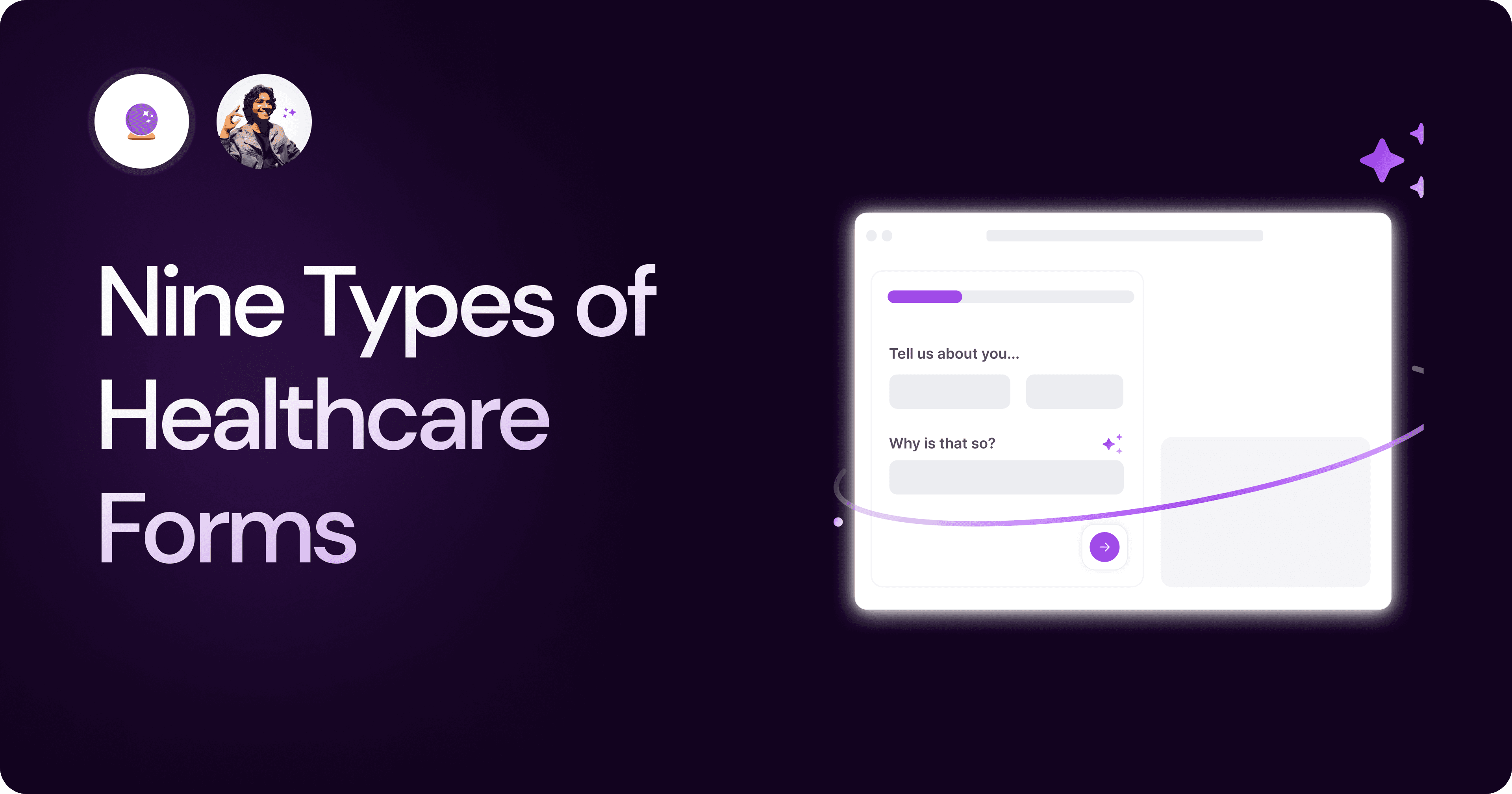
Nine Types of Healthcare and Medical Forms.
Medical forms are a must-have for any healthcare business or practitioner. Learn about the different kinds of medical and healthcare forms.
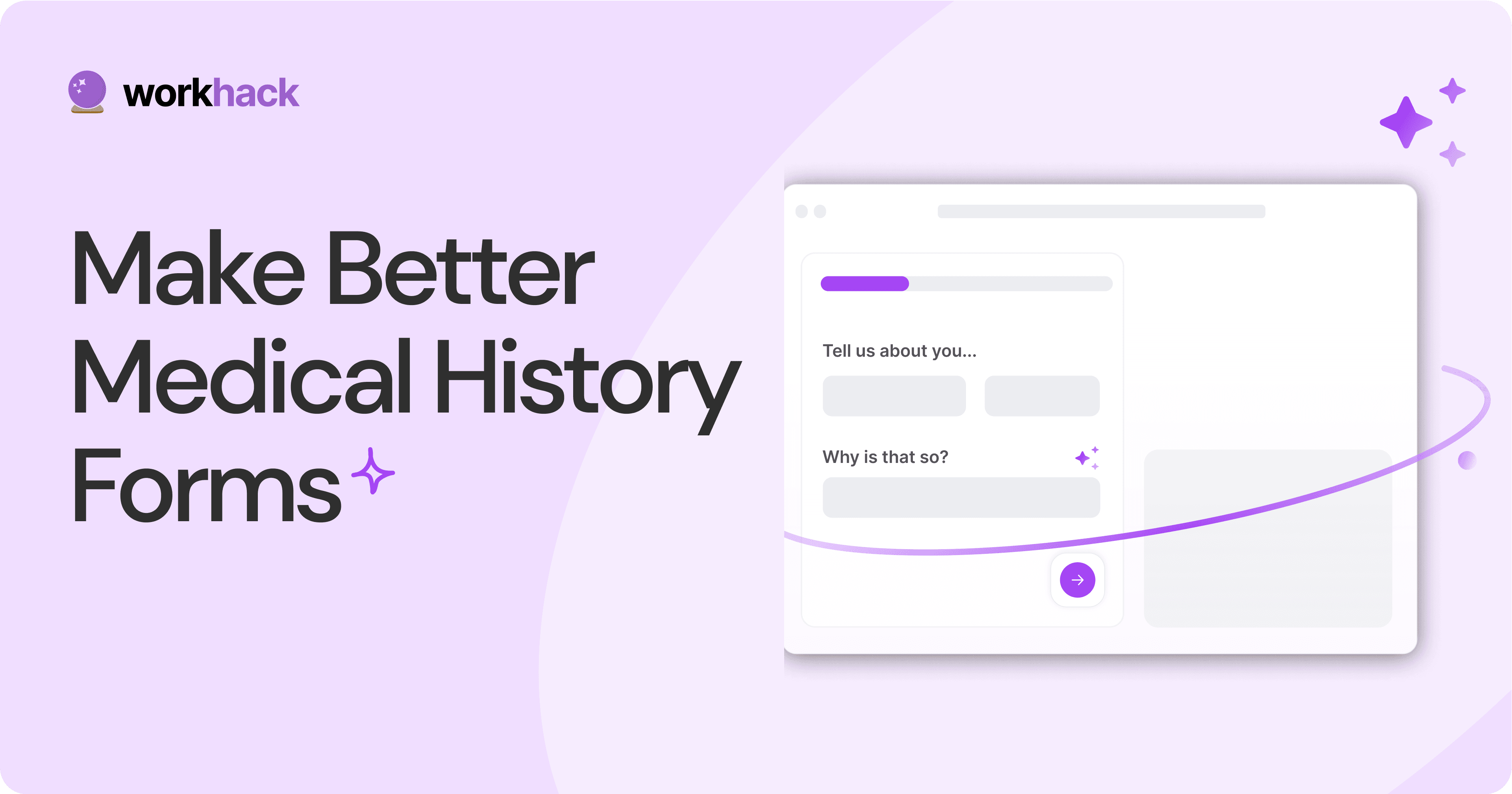
4 Tips for Better Medical History Forms.
Medical history forms are central to patient care, onboarding, and medical administration records. Learn how to make them easier to fill.
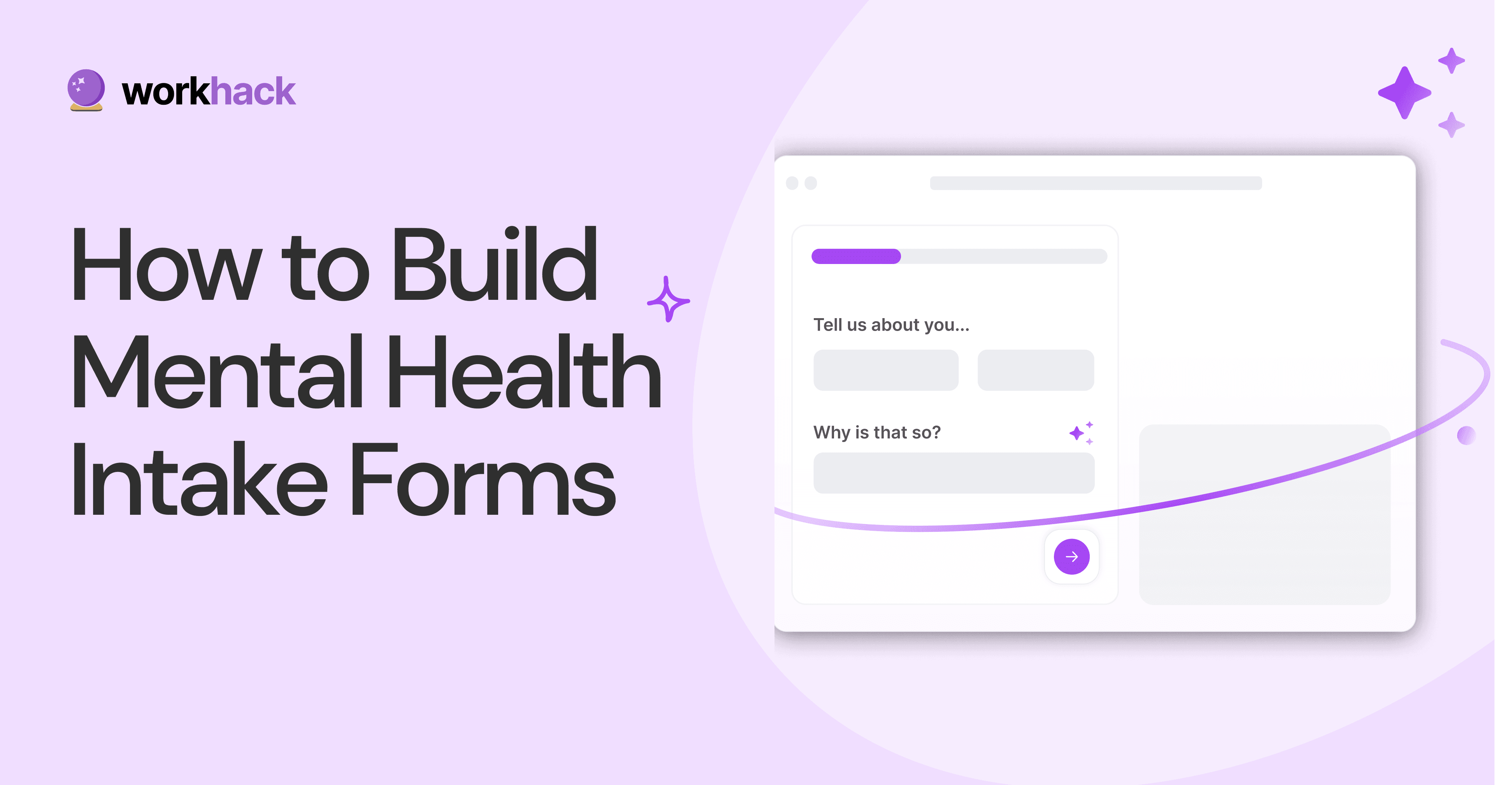
How to Build Mental Health Intake Forms?
Mental health intake forms are not like patient intake forms. Mental health intake forms deal with far more sensitive data and have specific design methods.
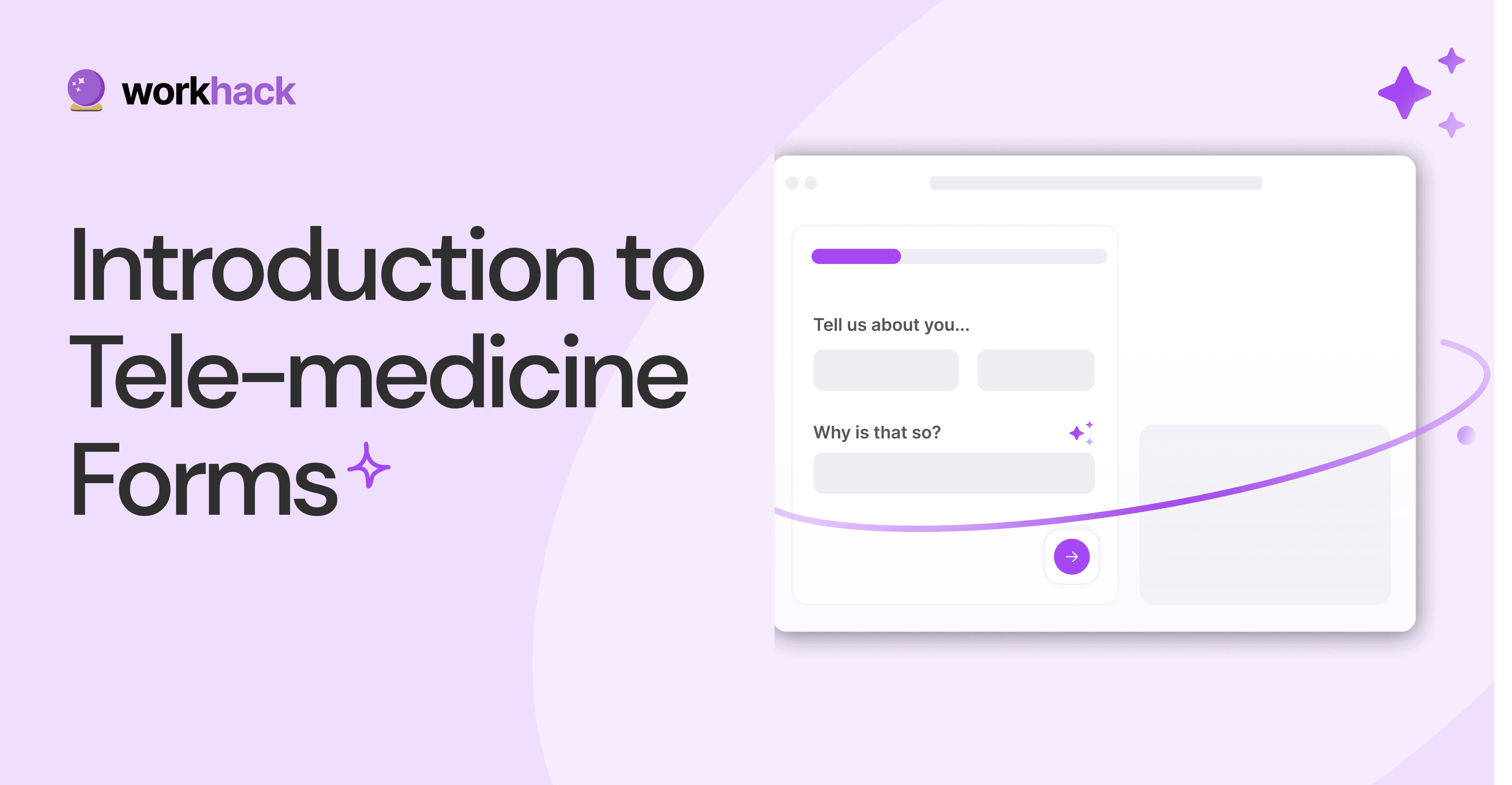
What, Why and How of Telemedicine Forms.
Telemedicine is on the rise and with different form builders out there, which one best suits your needs as a healthcare services provider?
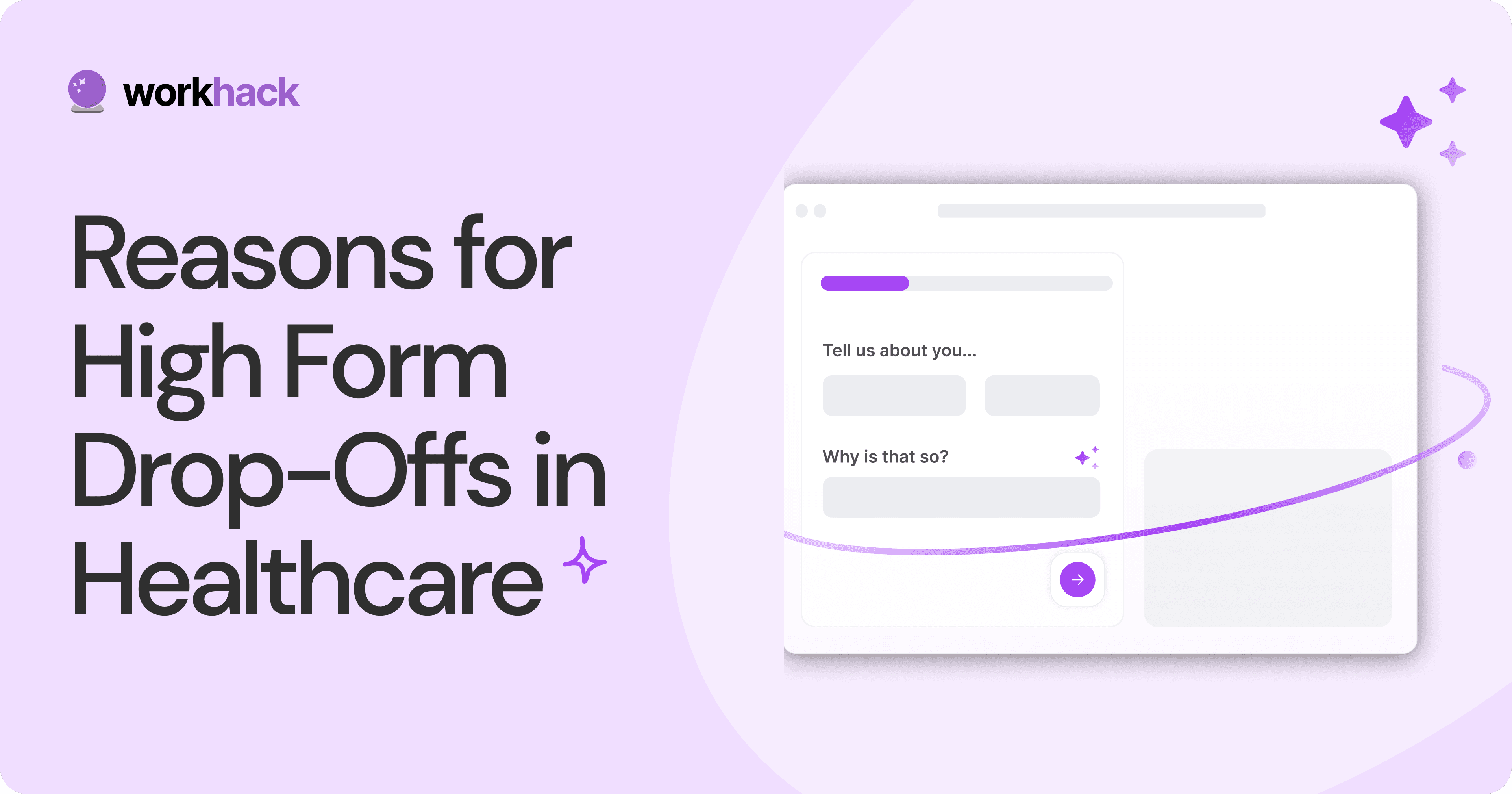
3 Reasons for Major Drop-Offs in Medical Forms.
No matter which healthcare form we pick, there are major drop-off reasons. We shall dive into the top 3 and learn how to resolve them in your next form.
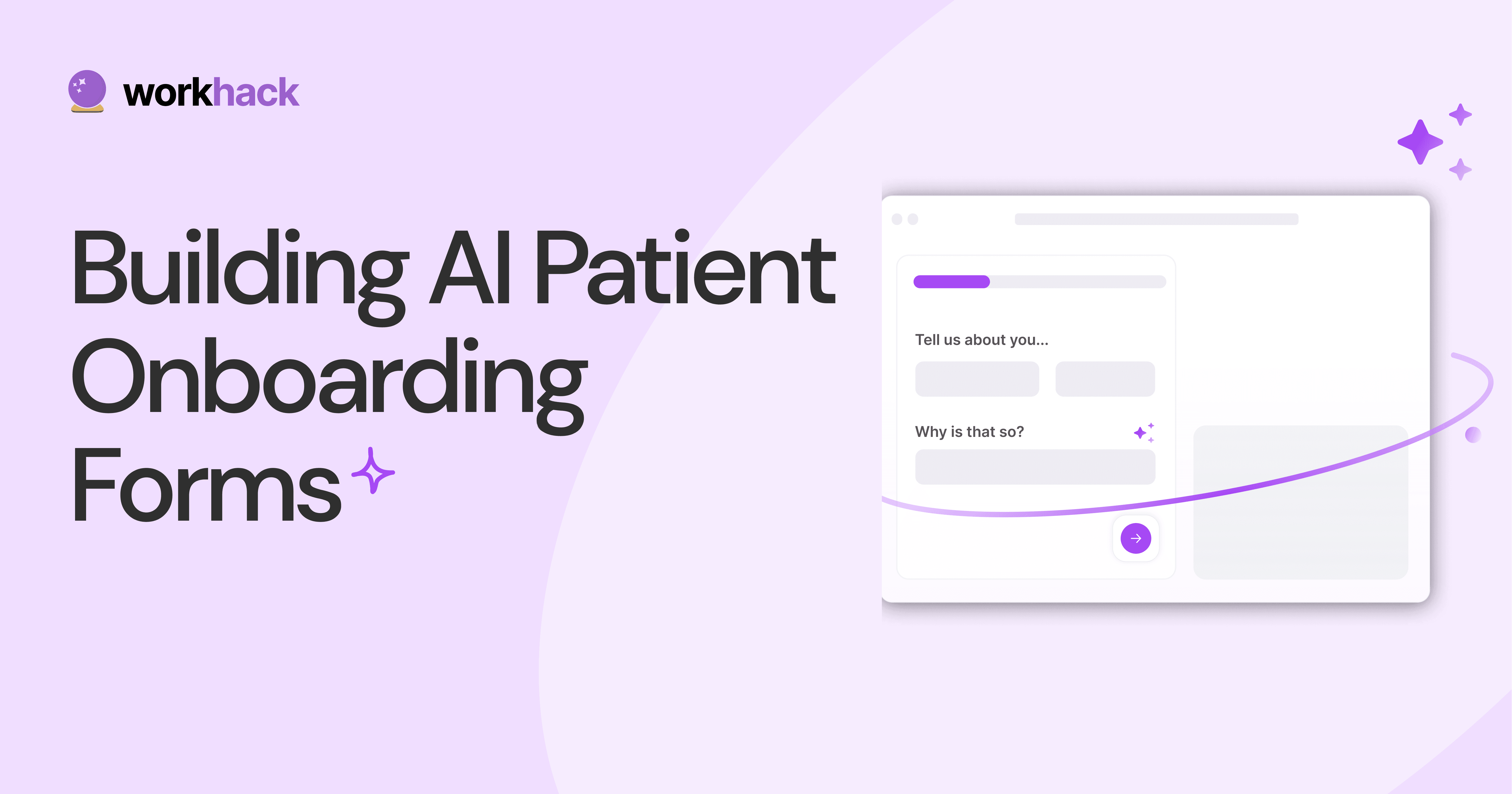
Patient Onboarding Forms - From Click to Clinic.
Patient onboarding forms are the first touchpoint for patients; getting this right for higher conversion rates is a must-have. Learn how to perfect them now.
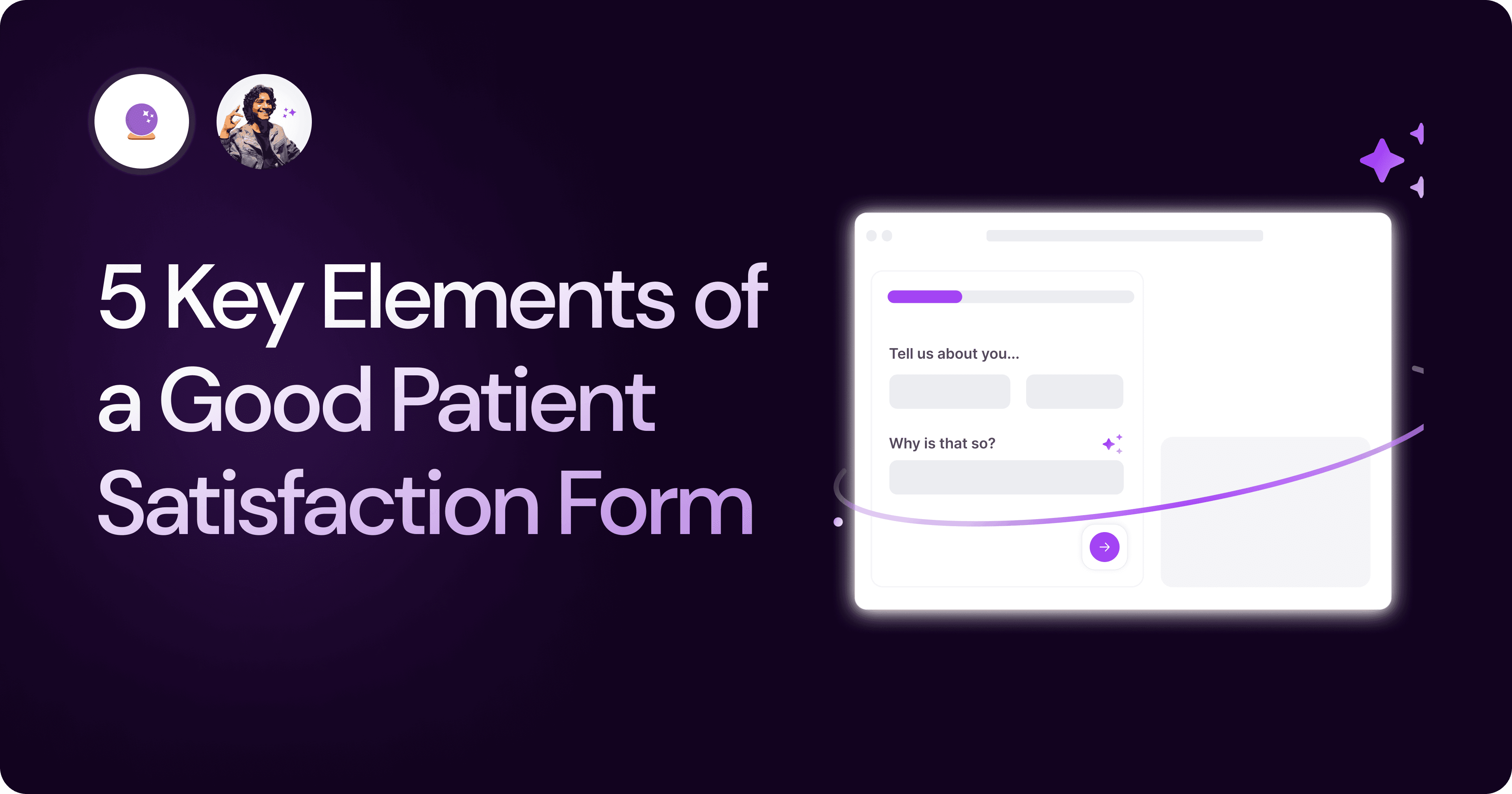
5 Key Parts of a Good Patient Satisfaction Form.
The goal of patient satisfaction surveys is to course-correct the services of a healthcare provider. Patient feedback leads to a culture of patient-centric care.
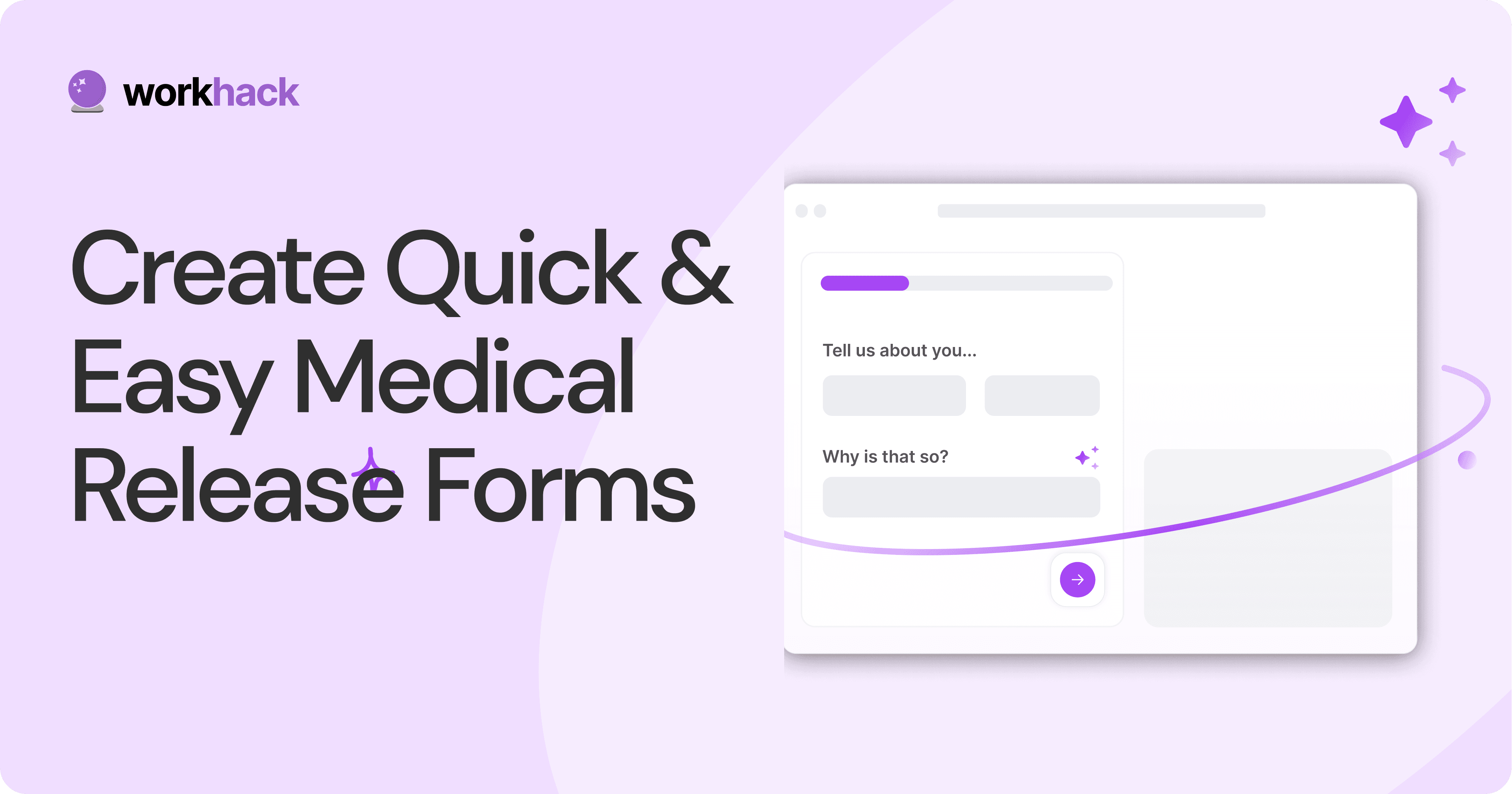
Build Quick and Easy Medical Release Forms.
Every HIPAA-compliant healthcare provider comes across medical release forms that involve details from medical history forms. Can they be shipped fast? Yes.

Nine Types of Healthcare and Medical Forms.
Medical forms are a must-have for any healthcare business or practitioner. Learn about the different kinds of medical and healthcare forms.

4 Tips for Better Medical History Forms.
Medical history forms are central to patient care, onboarding, and medical administration records. Learn how to make them easier to fill.

How to Build Mental Health Intake Forms?
Mental health intake forms are not like patient intake forms. Mental health intake forms deal with far more sensitive data and have specific design methods.

What, Why and How of Telemedicine Forms.
Telemedicine is on the rise and with different form builders out there, which one best suits your needs as a healthcare services provider?

3 Reasons for Major Drop-Offs in Medical Forms.
No matter which healthcare form we pick, there are major drop-off reasons. We shall dive into the top 3 and learn how to resolve them in your next form.

Patient Onboarding Forms - From Click to Clinic.
Patient onboarding forms are the first touchpoint for patients; getting this right for higher conversion rates is a must-have. Learn how to perfect them now.

5 Key Parts of a Good Patient Satisfaction Form.
The goal of patient satisfaction surveys is to course-correct the services of a healthcare provider. Patient feedback leads to a culture of patient-centric care.

Build Quick and Easy Medical Release Forms.
Every HIPAA-compliant healthcare provider comes across medical release forms that involve details from medical history forms. Can they be shipped fast? Yes.

Nine Types of Healthcare and Medical Forms.
Medical forms are a must-have for any healthcare business or practitioner. Learn about the different kinds of medical and healthcare forms.

4 Tips for Better Medical History Forms.
Medical history forms are central to patient care, onboarding, and medical administration records. Learn how to make them easier to fill.

How to Build Mental Health Intake Forms?
Mental health intake forms are not like patient intake forms. Mental health intake forms deal with far more sensitive data and have specific design methods.

What, Why and How of Telemedicine Forms.
Telemedicine is on the rise and with different form builders out there, which one best suits your needs as a healthcare services provider?

3 Reasons for Major Drop-Offs in Medical Forms.
No matter which healthcare form we pick, there are major drop-off reasons. We shall dive into the top 3 and learn how to resolve them in your next form.

Patient Onboarding Forms - From Click to Clinic.
Patient onboarding forms are the first touchpoint for patients; getting this right for higher conversion rates is a must-have. Learn how to perfect them now.

5 Key Parts of a Good Patient Satisfaction Form.
The goal of patient satisfaction surveys is to course-correct the services of a healthcare provider. Patient feedback leads to a culture of patient-centric care.

Build Quick and Easy Medical Release Forms.
Every HIPAA-compliant healthcare provider comes across medical release forms that involve details from medical history forms. Can they be shipped fast? Yes.

Nine Types of Healthcare and Medical Forms.
Medical forms are a must-have for any healthcare business or practitioner. Learn about the different kinds of medical and healthcare forms.

4 Tips for Better Medical History Forms.
Medical history forms are central to patient care, onboarding, and medical administration records. Learn how to make them easier to fill.

How to Build Mental Health Intake Forms?
Mental health intake forms are not like patient intake forms. Mental health intake forms deal with far more sensitive data and have specific design methods.

What, Why and How of Telemedicine Forms.
Telemedicine is on the rise and with different form builders out there, which one best suits your needs as a healthcare services provider?

3 Reasons for Major Drop-Offs in Medical Forms.
No matter which healthcare form we pick, there are major drop-off reasons. We shall dive into the top 3 and learn how to resolve them in your next form.

Patient Onboarding Forms - From Click to Clinic.
Patient onboarding forms are the first touchpoint for patients; getting this right for higher conversion rates is a must-have. Learn how to perfect them now.

5 Key Parts of a Good Patient Satisfaction Form.
The goal of patient satisfaction surveys is to course-correct the services of a healthcare provider. Patient feedback leads to a culture of patient-centric care.

Build Quick and Easy Medical Release Forms.
Every HIPAA-compliant healthcare provider comes across medical release forms that involve details from medical history forms. Can they be shipped fast? Yes.
Subscribe to stay updated.
Subscribe to stay updated.
Subscribe to stay updated.
HC

HC

HC

HC

70+ people from across industries read our emails.
HC

HC

70+ people from across industries read our emails.
HC

HC

HC

70+ people from across industries read our emails.




Bangalore, India / San Francisco, US
WorkHack Inc. 2023
Bangalore, India
San Francisco, US
WorkHack Inc. 2023
WorkHack Inc. 2023
Bangalore, India / San Francisco, US
WorkHack Inc. 2023
Bangalore, India / San Francisco, US



